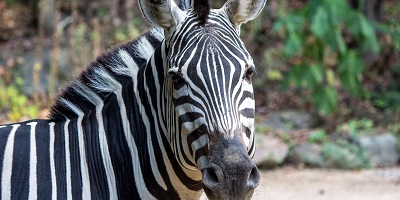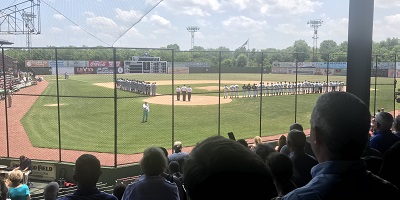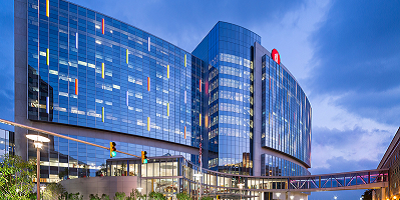Rotary Trail
Although Rotary Trail is only half a mile, it stretches from 20th Street to 24th Street, linking two of Birmingham’s unique attractions: the 19-acre Railroad Park near its western end and National Historic Landmark Sloss Furnaces on the eastern end.
In anticipation of the Rotary Club’s 100th anniversary in 2013, the centennial Rotary Trail project came to fruition through members wanting to gift a legacy to the City of Birmingham. The $3.5 million project transformed a vacant railroad right-of-way, or “cut,” into a pleasantly-landscaped, four-block walking/running/biking path.
The trail opened in 2016 with a 46-foot-tall sign that reads, “Rotary Trail in the Magic City.” The sign is a replica and tribute to an iconic sign that stood outside the Birmingham Terminal Station from 1926-1952.
Looking to the future, the trail opens the economic opportunity of being a link within a larger trail system. Long-term plans see the trail system connecting Sloss Furnaces to the Ruffner Mountain preserve in Eastern Birmingham.
Learn more about the Rotary Trail
Ruffner Mountain
Ruffner Mountain is made up of 1,038 acres of biodiverse urban forest connecting the communities of East Lake, Irondale, Roebuck Springs and Greater Birmingham with 14 miles of trails, nature education and EcoArts programs.
The area that is Ruffner Mountain was mined for iron ore from the late 19th century through the 1950s. In 1896, a local newspaper reported that its mines produced over 200 tons of raw ore per day for processing at nearby Sloss Furnaces. In 1977, a grassroots community movement formed to create the Ruffner Mountain Nature Coalition. Their mission was to protect the mountain ecosystem and stop a land developer's plan to build an apartment complex on the site.
Through research and restoration, Ruffner Mountain is the home to habitat gardens, mine reclamation and bat habitat conservation, riparian restoration and longleaf pine restoration. Today, countless species of flora and fauna thrive on the mountain and continuous research is conducted to ensure that Ruffner Mountain will continue to grow and have high biodiversity.
Learn more about Ruffner Mountain
Red Mountain Park
Welcoming 150,000 visitors a year, Red Mountain Park encompasses 1,500 acres along the Red Mountain Ridge in Central Alabama. As the largest park in Birmingham, Red Mountain Park connects diverse communities and encourages all to enjoy the urban greenspace.
As the site of the iron-ore mining that helped build Birmingham, Red Mountain was once the city’s greatest resource. This historic industrial site — a half-century dormant — has been revived with trails dotted with remnants of the mountain’s past.
Red Mountain Park has attractions and trails available for all ages. It boasts 15 miles of trails, three breathtaking tree houses, and the six-acre off-leash Remy’s Dog Park.
Learn more about Red Mountain Park
Vulcan Park and Trail
Watching over the City of Birmingham is Vulcan, the Roman god of fire and forge. Standing atop Red Mountain, this colossal statue, designed by Italian artist Giuseppe Moretti and cast from local iron to represent Birmingham at the 1904 World’s Fair, is the world’s largest cast iron statue and is considered one of the most memorable works of civic art in the United States.
In the 1930s, Vulcan was placed on a 124-foot pedestal crafted of local sandstone as part of the Works Progress Administration (WPA) project which created the namesake park. Situated on the major north/south highway at the time, Vulcan Park became one of the state’s earliest tourist attractions and the iconic landmark of the city of Birmingham. After years of exposure to the elements, by the late 1990s, the iron statue had fallen into disrepair. With Vulcan’s importance to the region’s history, community leaders formed the nonprofit Vulcan Park Foundation which oversaw a $16 million park renovation and restoration of the statue and his pedestal. A dynamic educational park complex was created to share Alabama’s industrial past, providing visitors context for appreciating Birmingham’s unique culture and history. Visitors enjoy breathtaking panoramic views from atop Vulcan’s observation tower, peer into an iron ore mine and learn more about local attractions from the official visitor information desk.
Running below Vulcan Park and Museum is the two-mile Kiwanis Vulcan Trail. The trail scales the ridge of Red Mountain and overlooks the city of Birmingham offering a bird's-eye view of many notable historic structures and areas, including the Five Points South and Birmingham Civil Rights Districts. Best of all, the path traces the route of the former L&N Birmingham Mineral Railroad making for a flat and easily accessible experience.
Learn more about Vulcan Park and Trail
Railroad Park
Centered in the middle of Birmingham, Railroad Park is a 19-acre greenspace that is the ideal place to exercise, relax or have a picnic. It includes nine acres of open lawn, walking trails, two age-appropriate play areas, outdoor gym equipment and multiple biking and walking paths. One of the most popular destinations in the Birmingham area, Railroad Park is enjoyed by people of all ages and backgrounds.
Railroad Park is 30% water, with a beautiful lake, a stunning rain curtain, a bio-filtration wetlands area and ponds and streams everywhere. In the middle of a bustling urban environment sit 600 trees, and the beautiful landscaping is punctuated with masses of annual, biennial and perennial flowers that bring color and joy to the park.
The park opened in 2010 and is proudly owned by the City of Birmingham and managed by the nonprofit Railroad Park Foundation. Many of the walls and seating areas were constructed from bricks and objects unearthed on the site when Railroad Park construction began. Reused and recycled objects including hand cast bricks and original cobblestone can be found throughout the park.
You can visit the park for free 365 days a year, thanks to the City of Birmingham and many private donors. Unofficially dubbed "the City's Front Lawn," Railroad Park hosts dozens of events and community activities each year, including concerts, athletic events and food festivals





 To exercise your privacy choices,
To exercise your privacy choices,